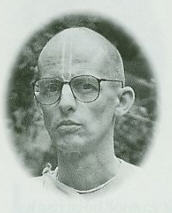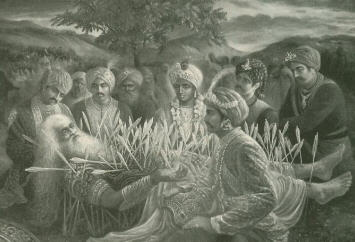
Satsvarupa Dasa Goswami
MISERY AND HAPPINESS come and go in this world, just like winter and summer. The Bhagavad-gita advises us to tolerate both happiness and distress. We are meant to tolerate while we keep performing our duties, and we are meant to keep worshiping Krsna despite everything. The Bhagavatam (10.14.8) states, tat te 'nukampam su-samiksamano… "My dear Lord, one who earnestly waits for You to bestow Your causeless mercy upon him, all the while patiently suffering the reactions of his past misdeeds and offering You respectful obeisances with his heart, words, and body, is surely eligible for liberation, for it has become his rightful claim." This verse defines the mood of a devotee facing adversity.
Suffering is caused by our past acts. Therefore, a devotee should not expect immediate relief from his or her past karma. Prabhupada has assured us that Krsna minimizes our karmic reactions when we take up devotional service. But a devotee also looks at the suffering in the material world as a reminder of the harshness of illusion. Suffering is a teacher. Our hands are being rapped: "Pay attention! Work to get out of this material world! Remember Krsna!"
There can be no peace in the material world, where no one is free from karmic reactions. As long as we stay in material existence we must continuously suffer or enjoy the results of our past acts. The Nectar of Devotion describes these acts and their reactions as an almost unbreakable chain. Not only are we getting reactions to sins we have committed in the past, but present sinful activity is creating new reactions, reactions we will suffer in the future. And we have material desires within us that we have not yet acted upon. These also will have their reactions.
Devotees sometimes think they should be exempt from suffering because they are surrendered to Krsna. At initiation (the beginning of devotional life), the chain of karmic reactions is broken. Krsna tells us in Bhagavad-gita, sarva-dharman parityajya mam ekam saranam vraja, aham tvam sarva-papebhyo: all papa (sin) will be removed by surrender to Him. But Prabhupada tells us that Krsna will still give us a token reaction as a reminder of the dangers of the material world and as an impetus to greater surrender. He gives us enough suffering to break our attachments. He wants to wean us from sense gratification and free us from further entanglement. And He wants us to love Him completely.
A devotee doesn't want to be detained in the material world. So he always looks for ways to increase his remembrance of Krsna. Happiness and distress are the same for a devotee because they push the mind toward Krsna. Our real solace as devotees is to spend our days in that spirit.
The Bhagavatam states that liberation becomes the rightful claim for one who thinks like this. The exact word used to describe him is daya-bhak, "a rightful heir." A pure devotee who is prepared to undergo any tribulation for Krsna consciousness becomes fit to enter the transcendental abode. Sridhara Swami comments, "What does a son have to do to get his father's property? He simply has to stay alive." To inherit a place in the spiritual world, we have to stay spiritually alive in all situations.
An example was set by Maharaja Yudhisthira. He was a great devotee of Krsna, but he suffered heavily, both in exile with his brothers and after the Kuruksetra War. Maharaja Yudhisthira was an honest and pious king. So when he thought of all the deaths caused by the war a war fought simply to enthrone him he felt weighed down by guilt and sorrow. No one could relieve him. Krsna then advised him to go for instruction to Bhisma.
At that time, Bhisma was lying on a bed formed by the arrows shot through his body. He was in great pain. Yet instead of going to him to ease his last days, Yudhisthira and his four brothers approached Bhisma to ask for help. Bhismadeva said,
sarvam kala-krtam manye
bhavatam ca yad-apriyam
sapalo yad-vase loko
vayor iva ghanavalih
"In my opinion, your suffering is all due to inevitable time, under whose control everyone in every planet is carried, just as the clouds are carried by the wind" (Bhagavatam 1.9.14). God's ways are unknown. Everything happens under the control of time, according to the will of the Lord.
We are so tiny. Who are we to question the vast intelligence of the universe? Who are we to demand to fathom or change that which Krsna has set up? As Prabhupada says about Yudhisthira, we should not be sorry for the inconceivable action of time.

Hrd-vag-vapurbhir vidadhan namas te… All we can do is continue to offer obeisances to Krsna from the core of our hearts. Yudhisthira's sufferings were not reactions for sins committed in his past, but "everyone has to bear the actions and reactions of time as long as one is within the conditions of the material world." Even the most pious person has to suffer because of material nature. If this were not so, the material world would be nondifferent from the spiritual world, Vaikuntha the place of no anxiety.
Bhisma added, "Oh, how wonderful is the influence of inevitable time. It is irreversible otherwise, how can there be reverses in the presence of King Yudhisthira, the son of the demigod controlling religion; Bhima, the great fighter with a club; the great bowman Arjuna with his mighty weapon Gandiva; and above all, the Lord, the direct well-wisher of the Pandavas?" In the face of that which is inevitable, only a fool holds a grudge. As Bhismadeva states, there is no need to lament when something is beyond the control of any human being.
A devotee, though, goes beyond the inevitabilities of material nature and sees the hand of Krsna present in everything. Still, precisely what Krsna intends is beyond our knowing. "O king," said Bhismadeva, "no one can know the plan of Lord Sri Krsna. Even though great philosophers inquire exhaustively, they are bewildered." And Prabhupada adds in his purport:
The bewilderment of Maharaja Yudhisthira over his past sinful acts and the resultant sufferings is completely negated by the great authority Bhisma. Bhisma wanted to impress upon Maharaja Yudhisthira that since time immemorial, no one, including such demigods as Siva and Brahma, could ascertain the real plan of the Lord. So what can we understand about it?
Why did this happen to me? Bhisma considers this a useless question. Even the exhaustive philosophical inquiries of the sages cannot ascertain the reason. A devotee can simply have faith in Krsna's ultimate kindness, continue to worship Him with heart, mind, and words, and continue to patiently accept Krsna's mercy in whatever form it appears, whether in happiness or distress. In this way, a devotee earns the right to return to the spiritual world.
Satsvarupa Dasa Goswami is the author of more than two dozen books, including a six-volume biography of Srila Prabhupada.
